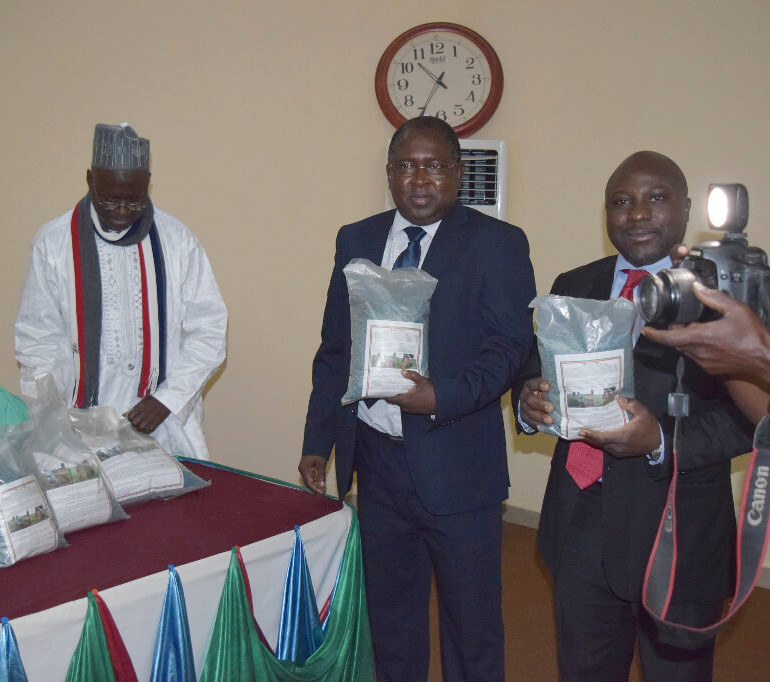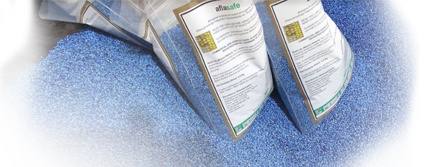BANJUL, THE GAMBIA, 24th March 2017 – Aflatoxin is a real and present danger in Africa’s food, affecting key staples such as maize and groundnuts, which are both very common foods across sub-Saharan Africa. The Gambia is no exception. Today, Aflasafe SN01™ was launched in Banjul, The Gambia, to combat aflatoxin in groundnuts and maize. Aflasafe is an all-natural biocontrol product, developed by the International Institute of Tropical Agriculture (IITA), in collaboration with national and international partners.
“The Gambia is amongst the first countries to benefit from Aflasafe registration and commercialisation strategy which will guide local manufacturing and distribution, and strategic interventions to enable Aflasafe’s uptake,” said Mr Matiéyédou Konlambigue, Managing Director of IITA’s Aflasafe Technology Transfer and Commercialization Project (ATTC). Besides The Gambia, the product is currently registered in another three countries – Senegal, Nigeria and Kenya.
A situational analysis conducted in The Gambia by the African Union’s Partnership for Aflatoxin Control in Africa (PACA) in 2015 revealed low awareness on aflatoxin and its dangers on human and animal health. The assessment vividly showed that the most significant impact is on human health.

Speaking on behalf of the Minister of Agriculture, Hon Omar A Jallow , the Permanent Secretary of the Ministry, Dr Sait Drammeh, said, “The government is aware of the multidimensional negative impacts of aflatoxin. We are deeply concerned with the findings of this study and are committed to ensure the implementation of the recommendations, and the action plan informed by the PACA country assessment. We note with concern our inability to enhance our foreign exchange earnings from groundnut exports due to aflatoxin contamination,” he said. He added that computations based on international and actual prices from 2008 to 2014 indicate a cumulative economic loss of about USD 22.8 million, which translates to a loss of USD 1.5 million as an annual average. “Tests conducted in Senegal and The Gambia over the past five years and two years, respectively, have resulted in an aflatoxin reduction level of more than 95%, which is very encouraging. This launch comes at a time when The Gambia is ready to address the issue of aflatoxin as a whole,” he said. In the 1960s and 70s, 66% of The Gambia’s agricultural export revenue came from groundnuts. Since then, this has fallen due to aflatoxin.
“Aflatoxin-contaminated grain is converted to bird feed, which does not fetch premium prices on the market,” said Ms Ndey Naffie Ceesay, the PACA Country Officer for The Gambia. “Sometimes exporting countries are penalised by receiving countries for the destruction of aflatoxin-contaminated products,” she cautioned. PACA has a 10-year plan for fighting aflatoxin in The Gambia which was validated in June 2016. A key goal in the plan’s first six months is public sensitisation on the perils of aflatoxin.
Mr Konlambigue commended the government of The Gambia for taking the lead in addressing the public health and competitiveness challenges created by aflatoxin. “The Gambia has recently developed and validated the National Aflatoxin Control and Investment Plan with PACA’s support. IITA would like to contribute to the achievement of this plan. For more than a decade, IITA has worked closely with the United States Department of Agriculture – Agricultural Research Service, and several national partners to develop Aflasafe,” he said. “In The Gambia, the collaboration between IITA and partners such as the Directorate of the Crop Protection Service, the National Agricultural Research Institute, the Food Safety and Quality Authority and the National Food Security Processing and Marketing Corporation led to the development of Aflasafe SN01,” he further clarified.
This customised all-natural product for The Gambia and Senegal is designed using native strains of Aspergillus flavus fungus that naturally occur in the two countries.
The effects of aflatoxin on Africa’s health and wealth are immense. It causes an estimated 5–30% of liver cancer worldwide, the highest incidence being in Africa (30%). Aflatoxin suppresses the immune system and stunts child growth. Poisoning can begin even before birth through mother-to-baby transmission. Thereafter, young children could continue ingesting aflatoxin through bottle and breast milk, and weaning on maize- or groundnut-based diets. It is an unforgiving and cumulative poison, piling up in our bodies as we continue to eat and drink contaminated foods. So dire is the problem that in some countries, studies show nearly all (more than 95%) of the children under five have aflatoxin in their body, indicating high aflatoxin exposure even at this early age. Internally, approximately 40% of the produce in African markets exceeds the aflatoxin maxima allowed. Externally, Africa potentially loses up to USD 670 million annually in lost export opportunities.
About ATTC: The Aflasafe Technology Transfer and Commercialisation Project (ATTC) implemented by IITA identifies strategic options for partnership with private companies or government entities, executes those partnerships, and helps ensure the distinct Aflasafe products reach millions of farmers. The project will contribute to improved food safety and increased income for smallholder African farmers through using Aflasafe. ATTC’s target is to cover half-a-million smallholder hectares with Aflasafe in 11 countries where Aflasafe is − or is likely to soon be − a nationally registered product. These are Nigeria, Kenya, Senegal, The Gambia, Burkina Faso, Ghana, Malawi, Mozambique, Tanzania, Uganda and Zambia. ATTC’s activities are geared to increase Aflasafe’s availability and accessibility, and to improve access to lucrative aflatoxin-conscious markets for maize and groundnuts.










